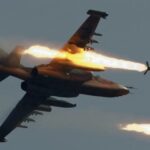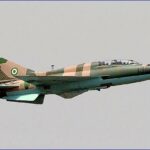September 14, 2020 will be exactly 50 years that the nation and, specifically, the Nigeria Air Force (NAF), were hit by the plane crash which killed one of the nation’s pioneer Air Force pilots, Major (Squadron Leader) Idris Maina, popularly known as Idi Maina.
The sad occurrence on Monday, September 14, 1970 might not be widely known in present-day Nigeria, but it remains indelible in many minds.
Fifty years after, those who witnessed the incident recalled with sorrowful nostalgia the death of Idi Maina, which happened at a time the country was in the mood of celebration.
Nobody would have expected that the impending October 1st Independence celebration of that time would be shattered by the Idi Maina tragedy.
Maina had joined the Nigerian Air Force in 1963 and was among the first batch of officers sent to Germany for jet pilot training courses following an agreement between Nigeria and the Republic of Germany.
The participants were expected to complete the courses in 1967, but it was cut short following issues arising from the January 15, 1966 coup, the first military intervention in Nigeria which dislodged the government of Prime Minister Abubakar Tafawa Balewa and President Nnamdi Azikiwe.
After the coup, the tension in the land was palpable and the country was drifting towards what would be a devastating civil war. The trained jet pilot returnees, Maina and the others, were drafted into the war to provide combat support for the soldiers at the war front.
Idi Maina was one of the NAF pilots who survived the war. Seven of them, particularly, stood out and were regarded as ‘the Magnificent Seven.’
They were Maina, Ibrahim Alfa, John Chukwu, Jide Akerele, Bayo Lawal, Ezekiel Aiyelagbe and Awak Smith.
In fact, there was a particular incident that happened in Agbor when Maina had to eject from the aircraft at a very low altitude. He was critically injured but survived it.
Although Maina and the few other officers survived the civil war, it was not without many bruises and scars, yet they never wavered in their commitment to protecting Nigeria’s unity and territorial integrity.
The civil war ended in 1970 and the nation was looking forward to the celebration of its 10th Independence anniversary. It was planned to be special after the popular declaration of the ‘no victor, no vanquished’ mantra that officially ended the Civil War.
Officers usually converged on Lagos, which was the then Federal Capital, to prepare for the ceremonial air display to herald the “Special Independence Anniversary Celebration” when the unexpected happened.
In the course of the air show involving the Mikoyan-Gurevich MiG-17, a high-subsonic fighter aircraft, tragedy struck when late Maina’s aircraft reportedly collided with the wing of an Ilyushin bomber aircraft (one of the aircraft also in display) losing control in the process.
Maina reportedly deployed his parachute and ejected into the Lagos lagoon but died in the process. It was a sad memory that his contemporaries and many NAF officers would not like to recall. To them, it was one of the darkest moments of Nigeria’s chequered history.
“It happened in the full glare of everybody in Marina. Many people watched as it happened over the lagoon. They were practising for the 10th independence anniversary,” said retired Air Vice Marshal, Ishaya Aboi Shekarri, who was at Marina on that fateful day.
The late Maina hailed from Potiskum and was the first NAF pilot in the old Bornu State. He died in active service, leaving behind his wife, Mrs Aduke, and a son who was only about three weeks old then.
Fifty years after, the sad event that resulted in the death of one of the most gallant, valiant and bravest NAF pilots Nigeria ever produced, is little known today in Nigerian history.
It was learnt, though, that he has a street named after him at the Ikeja Air Force Base, Lagos.
A former Head of State, General Abdulsalami Abubakar, who was sent to Germany for training at the same time with Maina, said Idi’s memories would always linger on.
“In his lifetime, Idi Maina was always smiling and was a generous, friendly and accommodating person. His doors were opened to all and sundry, regardless of tribe or religion. He was always ready to render a helping hand. No wonder he made friends throughout the nooks and crannies of Nigeria,” Abubakar said.
Observers say the greatest honour that could be done to Maina would be the documentation of the event that led to his death, to record his passion for the nation, his pan-Nigerian spirit and his unflinching dedication to the unity of Nigeria.
Zara wrote this piece from Abuja

 Join Daily Trust WhatsApp Community For Quick Access To News and Happenings Around You.
Join Daily Trust WhatsApp Community For Quick Access To News and Happenings Around You.
